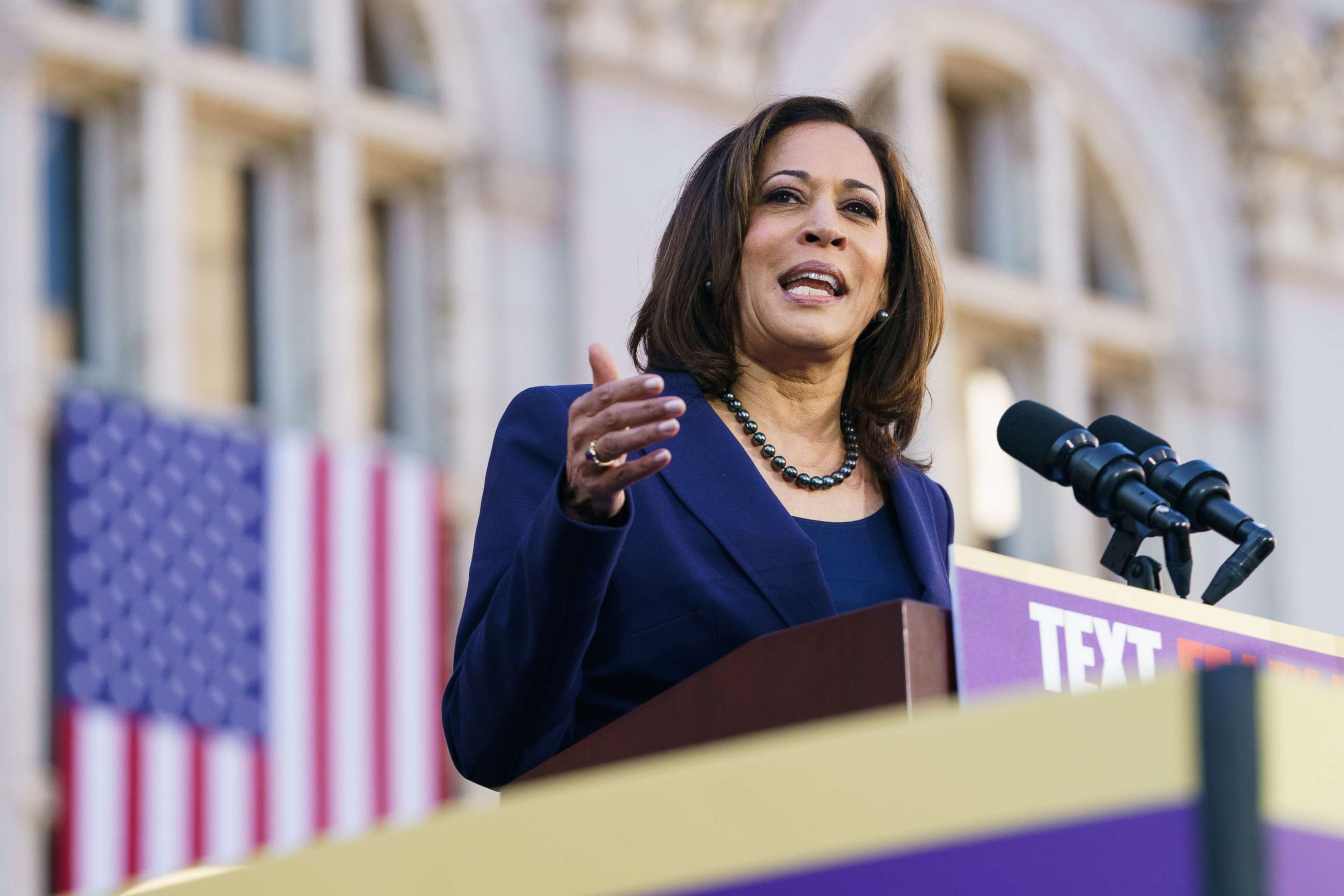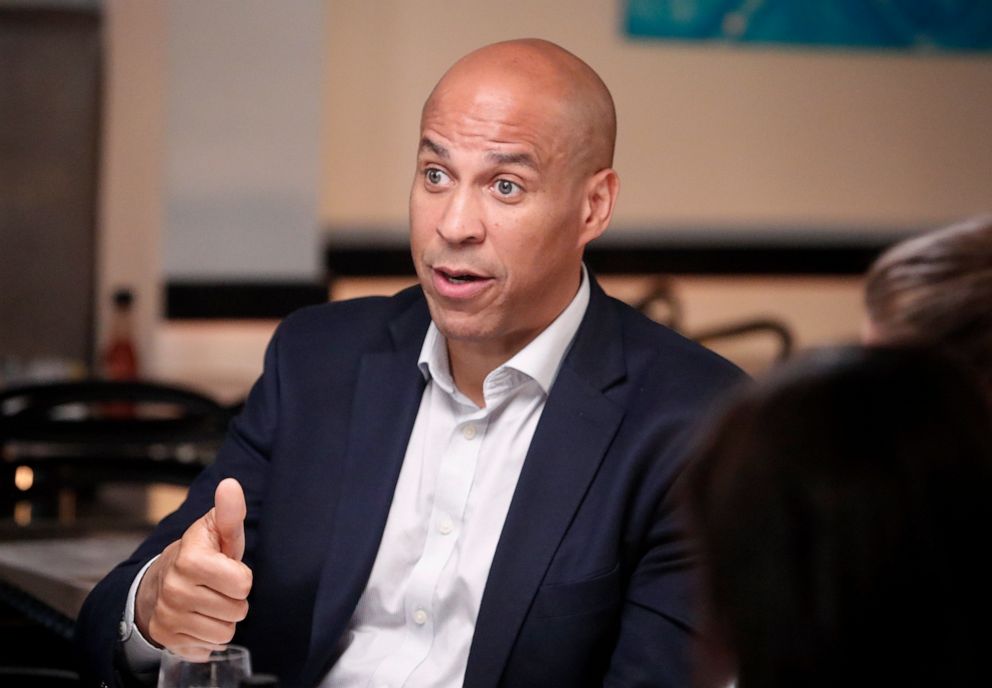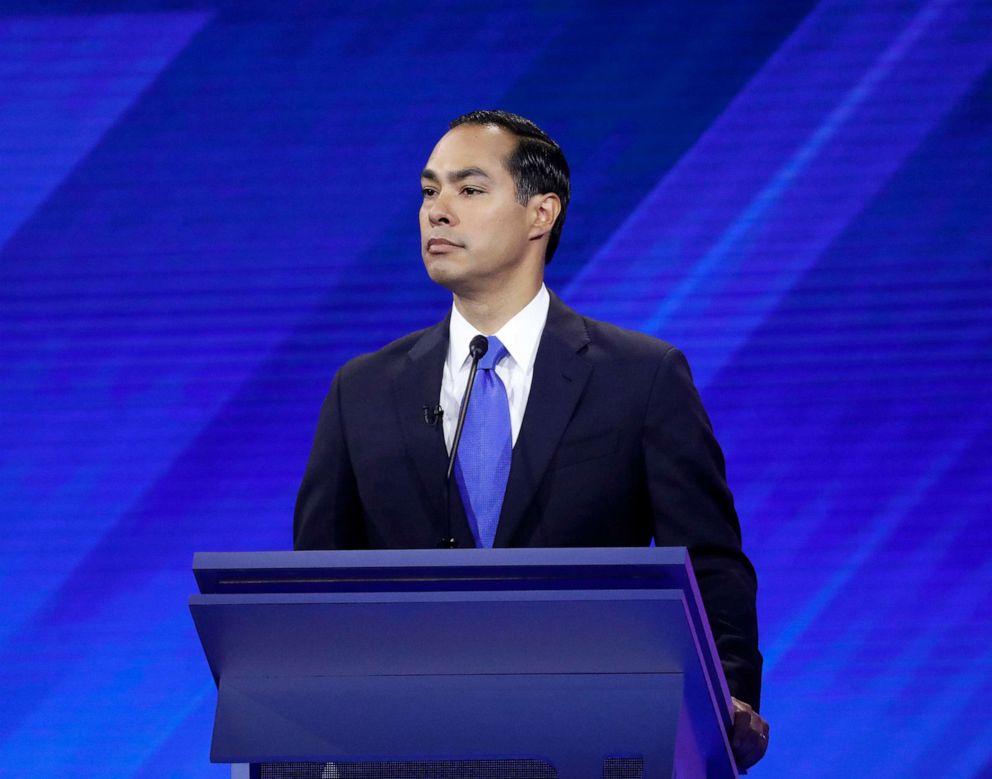Candidates of color raise concern over depleting diversity in the Democratic presidential field
The DNC says the current Democratic field is the most diverse in history.
Shortly after California Sen. Kamala Harris announced she was ending her presidential bid, the question of depleting diversity in the Democratic field became a rallying point for several of the remaining minority candidates in their own campaigns.
New Jersey Sen. Cory Booker in an impassioned speech on Thursday blasted the influence of money in politics as one of the reasons she dropped out.
“When an immensely qualified, widely supported truly accomplished black woman running to lead the party, a party that is significantly empowered by black women voters didn't have the resources that she needed to continue here to Iowa. What message is that sending?” Booker said. “I'm just gonna say it plain it is a problem that we now have an overall campaign for the 2020 presidency that has more billionaires in it than black people.”
The criticism is especially salient given that the current Democratic field is the most diverse in history.
However, several minority presidential candidates have complained that the structure of the Democratic National Committee's polling and fundraising rules to qualify for debates unduly makes it difficult to get the coveted primetime spots on stage needed to gain the national spotlight.
Further, they argue, billionaire-late comers to the race--all of them white men-- have been able to leverage their money to ensure they have ads in critical early state markets and in the social media spaces necessary to net the small donor donations to qualify for the debates.

It is an issue Harris herself cited in a video to supporters announcing she was leaving the race.
“So here’s the deal guys my campaign for president simply does not have the financial resources to continue,” Harris said. “I’m not a billionaire, I can’t fund my own campaign.”
The DNC has said the process has been balanced and fair and highlighted the current diversity in the field.
"This has been the most inclusive debate process with more women and candidates of color participating in more debates than billionaires. We are proud of this historic and diverse field with 20 candidates participating in the first two debates and at least 10 candidates in each debate after that. While we are legally required to have objective criteria for each debate, our qualifying criteria has stayed extremely low throughout this entire process," said DNC spokeswoman Xochitl Hinojosa. "Nobody who has failed to reach 4% at this point in the race has gone on to be the nominee, and our debate criteria reflects that. In addition, we have made diversity a priority by requiring that every debate have women and people of color as moderators. We’ve never seen a political party take this many steps to be inclusive."
Harris had qualified for the Democratic presidential debate later this month. With her departure from the race, only six candidates have made the cut to be on the debate stage-- none of them are people of color.
The situation offers an opportunity for self-reflection for the Democratic Party, said a political strategist who wished to remain anonymous.
"I think it's just a moment of reckoning for the party that's like, 'okay, why are we still ending up with an all-white top tier of candidates as the field winnow?' ” he said.
Booker’s presidential campaign said it saw its biggest online fundraising day the day after Harris dropped out, a surge they credit to people’s concerns that the diverse presidential field is narrowing.
Former Housing and Urban Development Secretary Julián Castro, announced his campaign had raised over $360,000 since Harris suspended her candidacy and sounded a similar note of alarm during a call with reporters during said a pre-planned visit to Harris’ home state of California.
“There’s a renewed sense out there that our primaries need better representation. Especially because we’re headed towards the debate, that will have no people of color on the stage,” Castro said.

Asked about the potential of an all-white debate stage in the upcoming Democratic debate, Massachusetts Sen. Elizabeth Warren also expressed concern.
"I mean, that’s the whole point. We are now looking at potentially a stage of -- there will not be a single person of color on that stage. And as I said, women have been forced out of this race at a time when billionaires can buy their way in. Michael Bloomberg just did a $37 million ad buy in one week in order to make himself a candidate, while he skips the usual parts of democracy like shaking hands with people and hearing directly about their concerns," Warren said.
Her departure has also sparked a scramble for Harris’ supporters and staff as Iowans prepare to cast the first ballots on Feb 3.
Castro didn’t answer directly if he was trying to clinch some of Harris’ endorsements, saying, “We're working hard for endorsements from elected officials, community leaders all across the country. Of course, especially in the early states and super Tuesday states.”
Mitch Henry, co-founder and communications director of Iowa’s Asian & Latino Coalition which endorsed Harris says that Castro’s campaign was the first of at least three other campaigns who reached out within hours of her announcement. He estimates that Castro’s campaign reached out about five minutes after Harris dropped out.
Minnesota Sen. Amy Klobuchar, billionaire businessman Tom Steyer, and Vermont Sen. Bernie Sanders’ campaigns also reached out within four hours of Harris dropping out, Henry said.
Henry has since endorsed Sanders’ campaign, although the coalition hasn’t decided who to back as a group yet.
“Where she stood on many issues is, you know, where Bernie stands. I mean, yes there's a difference in the Medicare for All, they both stood for Medicare for All, like Sen. Warren too but they had different proposals of how to get there,” Henry said.
Vanessa Phelan, chairwoman of the Northwest Des Moines Democrats, an endorser of Harris, said she started getting contacted by surrogates of other campaigns less than 24 hours after the senator ended her campaign.
“Yeah, I think I got the first text that evening,” Phelan said.
“Staffers, I know you are doing your jobs and you are lovely people and I like you bunches but please do not try to organize me today. TOO SOON,” she tweeted a day after Harris dropped out.

But she also considers the some of the renewed interest into Harris’ campaign and the people who support her disingenuous.
“People were happy to peddle misinformation, while she was in the race. Now that she's dropped out, people have nothing but respect for her. So it's, it's upsetting to me to see the attention that she is getting now. I think now people are starting to pick up on the fact that how inspirational she is to children. In particular, girls,” Phelan said.
Harris' campaign woes also stemmed from her own missteps, political experts said.
She was often criticized for not picking out a lane for herself in the Democratic field and either identifying herself as a moderate or more left-leaning candidate. Harris’ supporters backed her for a variety of reasons, making it harder to know who her supporters may endorse next in her absence.
"Part of the problem in terms of trying to figure out where Kamala Harris' supporters go, is that I think she had such a fragmented message that there wasn't a cohesive base behind her,” said, Jessica Levinson, political commentator and professor of law at Loyola Law School. “And so my guess is that they just kind of fan out. That there are some people who want a woman, there are some people who want a candidate of color, there's some people who want a moderate, there are some people who want a younger take of it.”
Glynda Carr. president and ceo of Higher Heights for America PAC, which seeks to help elect black women in elections across the country, a group which endorsed Harris in November, said that although they aren’t planning on endorsing another candidate and none have reached out since Harris’ suspended her bid, they’ll continue to help candidates engage with black female voters, a key voting bloc for the Democratic Party.
“Having a cycle starting with one of the most diverse stages, we've ever seen in the Democratic primary has pushed the envelope, not as far as we would like in some of our partnering organizations, but centering conversation of voters that look more like the electorate,” Carr said.
ABC News' Zohreen Shah, Cheyenne Haslett and Lissette Rodriguez contributed to this report.




